CARACAS, Venezuela — The group of three major Venezuelan ‘opposition’ parties that voted Thursday to dissolve the nation’s legitimate interim government led by Juan Guaidó ratified its decision with a joint statement released via social media on Tuesday.
The lawmakers met through an online Zoom call on December 22 to determine whether or not Guaidó’s interim presidency, which had so far been renewed on a yearly basis, should continue for an additional year.
Following the results of the December 22 call, in which 72 lawmakers voted in favor of dissolving the interim government and 23 voted against its dissolution, the opposition lawmakers will reconvene Thursday, December 29, to further discuss the fine details of dissolving the interim government. The follow-up discussion will include matters pertaining to Venezuela’s frozen overseas assets currently under the custody of the interim government.
The opposition Democratic Action (a member of the Socialist International), A New Era (also a member of the Socialist International), and Justice First political parties that called for the dissolution of Venezuela’s interim presidency released a statement via the Twitter account of opposition lawmaker Liz Carolina Jaramillo. The parties said they will “institutionally materialize the position that [they] have already made public” on the upcoming Thursday parliamentary session.
Atención 🚨
Acción Democrática, Movimiento por Venezuela, @Pr1meroJusticia y Un Nuevo Tiempo se dirigen al país:
👇🏼👇🏼 pic.twitter.com/tIwaKEdRtY
— Liz Carolina Jaramillo (@LizCJaramillo) December 27, 2022
“Legally, the interim government was designed to lead the country to free elections, having as its goal the thirty continuous days established in article 233 of the Constitution,” the statement reads. “However, four years after the creation of the interim, these elections have not been called or held, which are the raison d’être of the aforementioned constitutional norm.”
The Popular Will political party (another member of the Socialist International) alongside other parties, unsuccessfully called for renewing the interim government for an additional year during the December 22 vote.
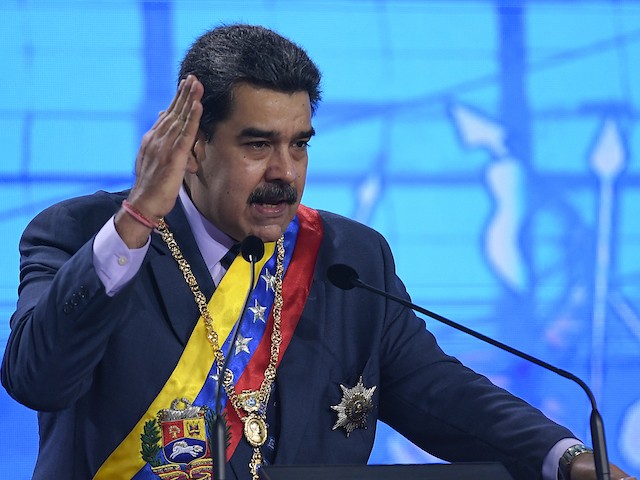
Venezuelan President Nicolas Maduro speaks during a ceremony marking the start of the judicial year at the Supreme Court in Caracas, Venezuela, January 22, 2021. (AP Photo/Matias Delacroix)
Venezuela’s interim government was established in January 2019 in accordance with the nation’s constitution following a rupture of democratic order that created a presidential crisis in Venezuela.
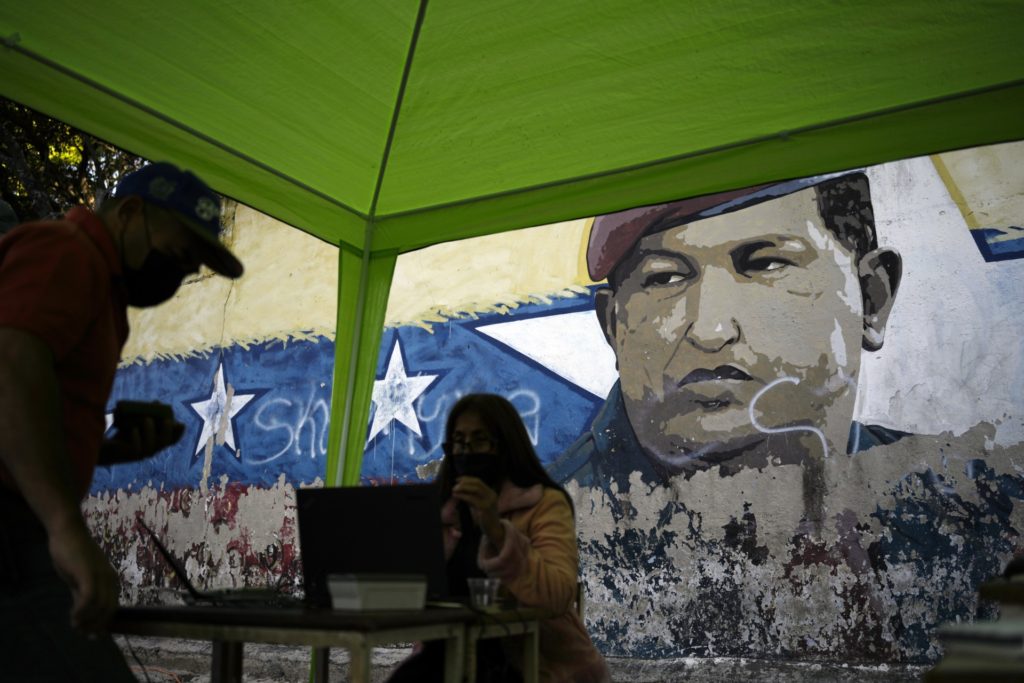
A mural of late President Hugo Chavez decorates a street wall where a table is set up, by the National Election Council (CNE), where people could sign a petition in favor of holding a referendum to remove President Nicolas Maduro from office in Caracas, Venezuela, Wednesday, January 26, 2022. (AP Photo/Matias Delacroix)
Socialist dictator Nicolás Maduro, whose last legitimate term was set to expire in January 2019, held a sham rigged presidential election in May 2018 to cling to power. In response, the opposition-led National Assembly, which at the time was the only branch of power not completely controlled by the socialist regime, designated Juan Guaidó as interim president of Venezuela.
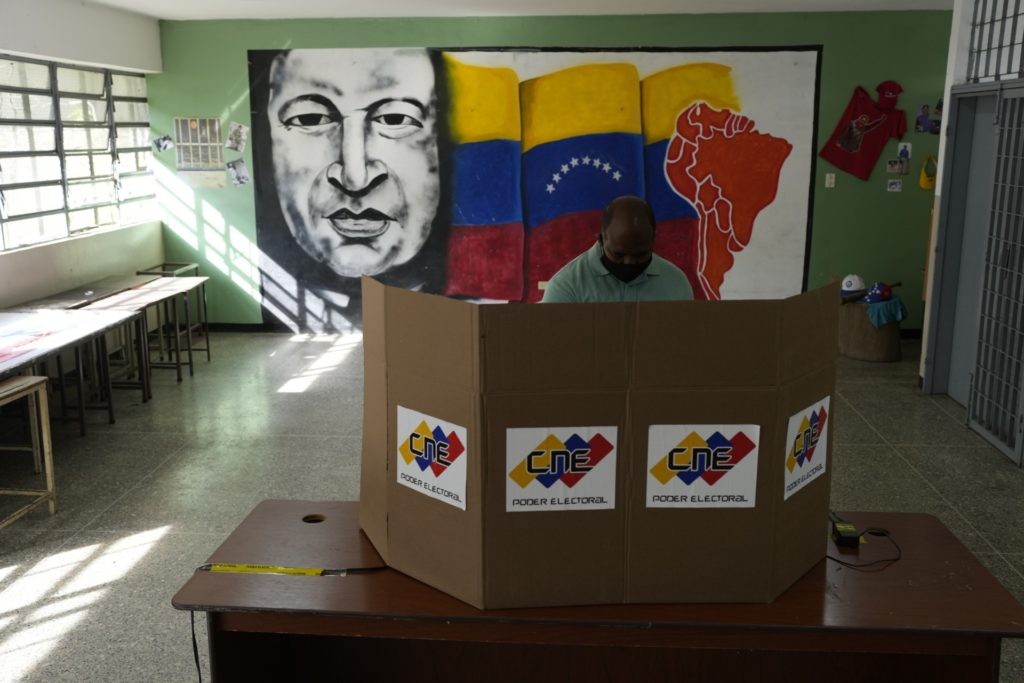
A man casts his vote during regional elections, at a polling station in Caracas, Venezuela, Sunday, November 21, 2021. (AP Photo/Ariana Cubillos)
Maduro’s presidency has not been recognized by the United States, Canada, the European Union, and 50 other nations, who opted to recognize Guaidó as Venezuela’s legitimate president. In light of this, Maduro has mostly relied on the international support of his ideological allies such as Cuba, China, Russia, Iran, and Turkey.
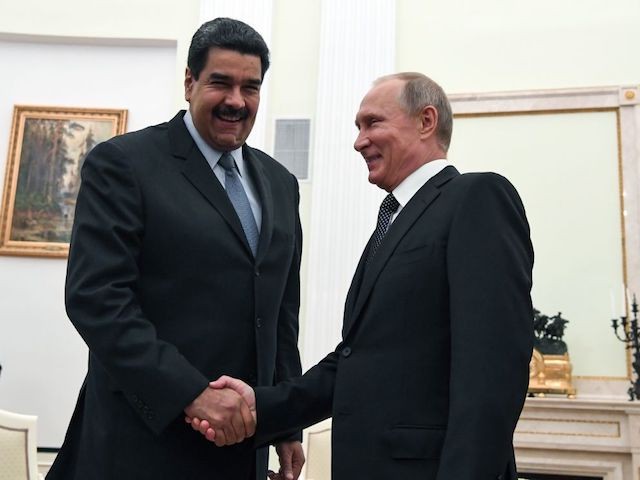
Russian President Vladimir Putin (R) shakes hands with his Venezuelan counterpart Nicolas Maduro during a meeting at the Kremlin in Moscow on October 4, 2017. (YURI KADOBNOV/AFP via Getty Images)
The interim government was originally established with the goal of restoring democracy in Venezuela by bringing an end to Maduro’s illegitimate presidency, establishing a transitional government, and then holding free and fair elections. However, the interim government and the opposition failed to achieve those goals and has not exerted any power in Venezuela after nearly four years, enduring as a symbolic figure of sorts that has no tangible effect in Venezuelans’ day to day affairs.
The Maduro regime has retained full control of Venezuela and its armed forces, and regained full control of the nation’s legislative branch by using sham parliamentary elections to oust the opposition-led congress in 2020.
As a result of the complete lack of any progress towards the end of the Maduro regime and the more than two decades of socialism in Venezuela, an overwhelming portion of the Venezuelan population — which had initially given its support to the interim government — rapidly lost all faith in Juan Guaidó’s presidency. The public chose to trust neither Maduro nor Guaidó by 2020, one year after the interim presidency was established.
“Politically, the interim government ceased to be useful in the democratization of Venezuela and is of no interest to the citizenry,” the opposition’s joint statement asserted.
In May 2022, a study published by the Venezuelan polling firm Meganálisis revealed that nearly 80 percent of Venezuelans believed that the ‘opposition’ was doing ‘absolutely nothing’ to put an end to socialism in Venezuela, and that they had simply sold out to the Maduro regime, a recurring conclusion that the nation’s population has reached during the past two decades of socialist rule.
At the face of the apparent imminent dissolution of his government — which, if finalized, will come to pass in early January 2023 — Juan Guaidó published a video on his personal Twitter account, asking for Venezuelans to speak out before the December 29 legislative session.
El 29 se dará la segunda discusión de la reforma de la Ley del Estatuto para la Transición. Defender a nuestra gente y la constitución son prioridad para nosotros.
Este es nuestro mensaje al país: pic.twitter.com/aSJNjomGD6
— Juan Guaidó (@jguaido) December 27, 2022
“These next 48 hours are vital for you Venezuelans to express yourself, for being the main mourner of this reform,” Guaidó said, while calling for all parliamentary forces to “do what’s best for Venezuela.”
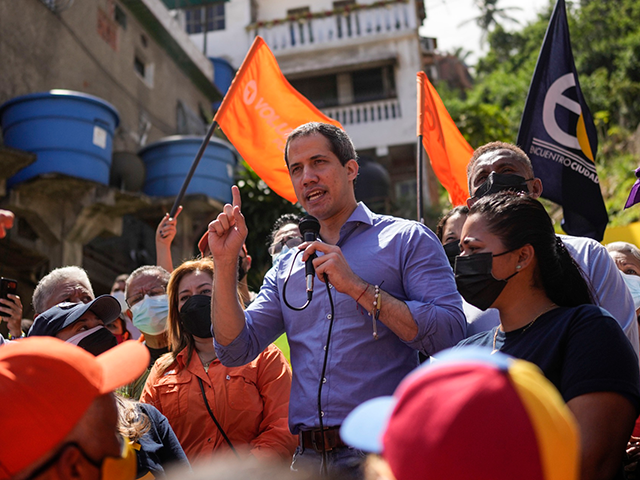
COMMENTS
Please let us know if you're having issues with commenting.